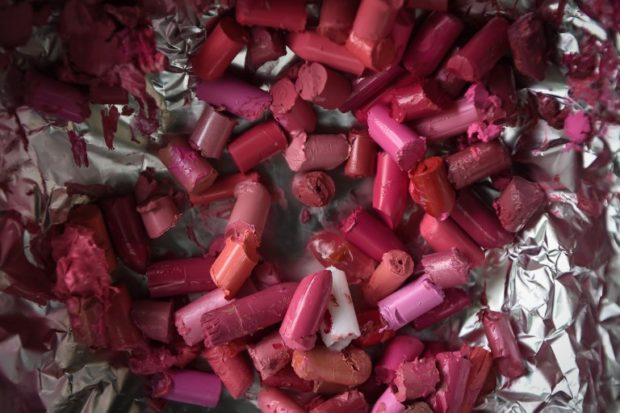
This photo taken on July 24, 2017, shows recycled tubes of lipstick ready to be melted over a stove in Bangkok. Desperate to brighten up the gloom of Thai prison life, Prontip Mankong and her fellow female inmates used to sneak food coloring from the kitchen and mix it with Vaseline to create a homemade lip gloss. Prontip now recycles cosmetics for those still stuck in Thailand’s notoriously bleak jails. AFP
BANGKOK, Thailand — Desperate to brighten up the gloom of Thai prison life, Prontip Mankong and her fellow female inmates used to sneak food coloring from the kitchen and mix it with Vaseline to create a homemade lip gloss.
After serving two years for violating Thailand’s royal defamation law, the former political prisoner is now on the other side of the prison gate.
But she is drawing on the same spirit of ingenuity to make recycled cosmetics for those still stuck in Thailand’s notoriously bleak jails, which are bursting at the seams in a country with the highest female incarceration rate in the world.
“The lip gloss boosted our confidence and gave us a sense of self-expression in a place where freedom is limited,” said Prontip Mankong, who was jailed for her role in a satirical play that authorities said mocked the royal family.
This photo taken on July 24, 2017 shows Prontip Mankong (left), a former political prisoner, melting lipstick as fellow ex-inmates and volunteers help recycle cosmetics in Bangkok. The recycled cosmetics help lighten up those still stuck in Thailand’s notoriously bleak jails. AFP
On a recent Sunday, the 29-year-old and other female ex-cons spent the afternoon slicing off the tops of thousands of donated lipsticks and grouping them into baskets by color.
The waxy chunks were boiled down over a stove into shimmering pink and magenta liquids, and then poured into small containers which will be donated to a women’s prison after they cool.
Of all the deprivations of prison life make-up may seem a minor one.
Yet Prontip sees the donated cosmetics as a simple way to boost morale and free up cash for inmates, whose lives are just as governed by money as those on the outside.
Inmates earn small incomes from jobs like cooking and making crafts, which they use to buy sanitary pads and other basic necessities from small convenience stores, where purchases are limited to around $10 a day.
This photo taken on July 24, 2017 shows female ex-inmates and volunteers recycling donated lipstick in Bangkok. AFP
“Getting cosmetics was very difficult and expensive,” she told AFP, explaining that some inmates would buy out all the beauty products from a small prison store and then jack up the price for other buyers.
This type of black market economy permeates the prison yard, with cash via prison jobs and relatives the only way to secure other comforts like longer showers or pain medicine.
“This money doesn’t go to the prisons but goes to the pockets of the influential inmates,” said Prontip, whose chipper attitude cracks when she starts recalling her own time behind bars.
Thailand’s prison problem
Thailand’s exploding prison population stems from the kingdom’s harsh anti-drug laws, where the possession of just a few methamphetamine pills is enough to land offenders a decade in jail.
The kingdom jails more women per capita than any other nation, with more than 80 percent of its 39,000 female convicts in prison on drug-related offences, according to the International Federation for Human Rights (FIDH).
Successive Thai governments have done little to reform drug laws or tackle dire overcrowding in prisons.
Many inmates sleep on hard linoleum floors in cells so cramped they have to rest on their sides or lay their limbs on top of one another.
Fluorescent lights are kept on throughout the night and dozens of prisoners have to share a single toilet in the back of the cell, with not even a curtain for privacy.
In conditions like these, small comforts can go a long way.
“Beauty can help,” said Watinee Chaithirasakul, a fashion blogger who helped collect cosmetics for Prontip’s project.
“It’s about helping them have a mentality that will allow them to live in that space.” CBB